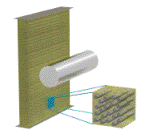Mechanical and Materials Engineering, Department of

Department of Engineering Mechanics: Dissertations, Theses, and Student Research
Date of this Version
Summer 6-22-2009
Document Type
Thesis
Abstract
New applications for polymer composite materials are occurring at a rapid pace today. These include structural components in the energy, transportation, and biomedical fields. Many if not all of these new applications will require that part performance is insured with some degree of sustainable damage. With the growth in the use of composite structures comes the necessity of improved methodologies that can predict more accurately the life and serviceability conditions of composite parts. Damage mechanics in two-phase composite materials is a very complex problem that has challenged researchers for many years. However, most of the available models perform only a macromechanics analysis that attempts to determine when the part will fail under a certain set of boundary condition, but do not provide a better understanding of how the materials fail, and what is the effect of individual constituents on the overall behavior of the material. Explicit modeling of microcracking is another issue that few researchers have attempted to address. Moreover, most models tend to neglect the viscoelastic behavior of composites. This paper describes a multiscale model based in continuum mechanics and thermodynamics that can be used as a predictive tool for designing viscoelastic structural components that undergo cracks on different length scales. This work also presents experimental results of glass-fiber reinforced polymers (GFRP) beams subjected to impact loads. The test setup included an instrumented drop weight machine and a high speed camera. Example problems and some comparisons of the experimental and numerical results are also shown.


Comments
A thesis Presented to the Faculty of The Graduate College at the University of Nebraska In Partial Fulfillment of Requirements For the Degree of Master of Science, Major: Engineering Mechanics, Under the Supervision of Professor David H. Allen. Lincoln, Nebraska: June, 2009
Copyright 2009 Victor Ferreira Teixeira